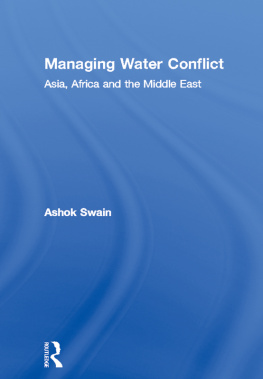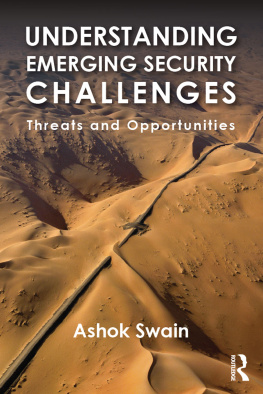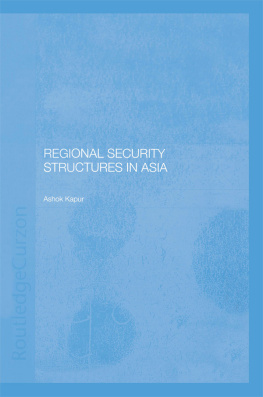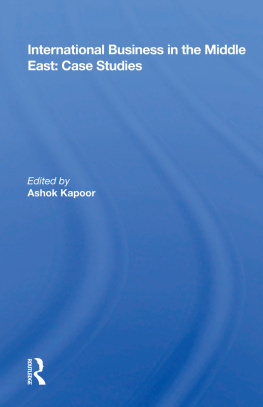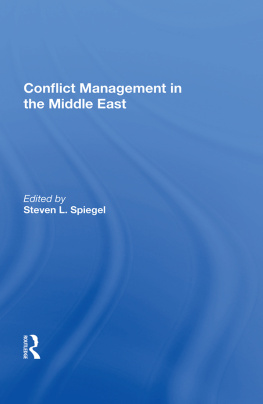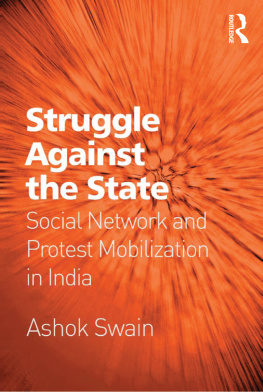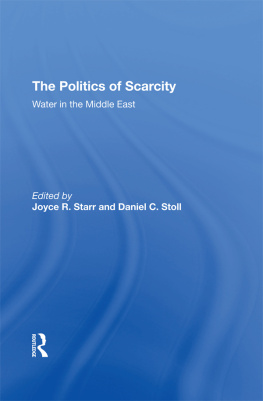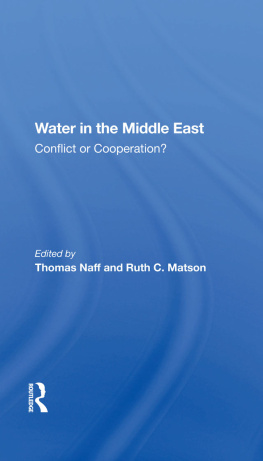MANAGING WATER CONFLICT
First published 2004
by Routledge
11 New Fetter Lane, London EC4P 4EE
Simultaneously published in the USA and Canada
by Routledge
29 West 35th Street, New York, NY 10001
Routledge is an imprint of the Taylor & Francis Group
2004 Ashok Swain
Typeset in Classical Garamond by
Frank Cass Books Ltd
Printed and bound in Great Britain by
Antony Rowe Ltd, Chippenham, Wiltshire
All rights reserved. No part of this book may be reprinted or
reproduced or utilized in any form or by any electronic,
mechanical, or other means, now known or hereafter
invented, including photocopying and recording, or in any
information storage or retrieval system, without permission in
writing from the publishers.
British Library Cataloguing in Publication Data
Swain, Ashok
Managing water conflict: Asia, Africa and the Middle East.
1. Water resources development 2. Water resources development
Case studies 3. Water resources development
International cooperation 4. Water resources development
International cooperation Case studies 5. Pacific
settlement of international disputes Case studies
I. Title
333.91
Library of Congress Cataloging-in-Publication Data
Swain, Ashok
Managing water conflict: Asia, Africa, and the Middle East / Ashok
Swain
p.cm
Includes bibliographical references and index
ISBN 0-714-65566-X (hardback)
1. Water-supplyAsiaManagementInternational cooperation. 2.
Water-supplyAfricaManagementInternational cooperation. 3.
Water-supplyMiddle EastManagementInternational cooperation.
4. Watershed managementAsia. 5. Watershed managementAfrica. 6.
Watershed managementMiddle East. 7. International riversAsia. 8.
International riversAfrica 9. International riversMiddle East. I. Title
TD299.S93 2004
363.61dc22
2003062745
ISBN 071465566X
MANAGING WATER CONFLICT
Asia, Africa and the Middle East
ASHOK SWAIN
Department of Peace and Conflict Research Uppsala University, Sweden
To the memory of B. N. Swain, my father
Contents
List of Maps, Tables and Figures
MAPS
TABLES
FIGURE
Preface
There is a water crisis today. Water is not only a commodity, it is synonymous with life. All life on earth is dependent on water. If water is life, its possession bestows power. Water has crucial economic value, and it is a subsistence resource. Also, water has an emotional and symbolic value for certain countries and communities. The scarcity of water is increasing worldwide and its quality is continuously deteriorating. Water shortages reduce food production, aggrandize poverty, amplify disease and force people to migrate. The scarcity of water also undermines the state's capacity to govern. Nearly half of the world's population lives in international river basins. Sharing of the international rivers can therefore be a serious object of contention between riparian nations. For the last few years, water war has been a topic of widespread debate. However, wars over river water are likely only under a narrow set of circumstances, as there are also more examples of water cooperation than water conflict among countries.
Nevertheless, the increasing scarcity of water raises doubt about the sustainability of these cooperative agreements over the international rivers. Water scarcity is particularly severe in Asia, Africa and the Middle East, owing to population growth, urbanization and industrialization. Whether the water crisis intensifies the dispute over the shared waters or whether it can be turned towards sustainable cooperative management of river resources, depends on many interacting processes. This book, after analysing the existing sharing mechanisms of the major international river systems in these regions, argues that the real solution lies in a comprehensive approach to river basin management.
Acknowledgments
This book would not have been possible without the accumulated help and support of several individuals in the last ten years. The Department of Peace and Conflict Research, Uppsala University, Sweden, is a perfect home for this work. My thanks go to all the Department colleagues who provided a stimulating research environment. Special thanks must go to Peter Wallensteen, who introduced me to this topic in the early 1990s and has remained as a source of constant support, motivation and inspiration. Ramses Amer, Hans Blomkvist, Gunnel Cederlf, Birger Heldt, Kjell-ke Nordquist, Margareta Sollenberg, Niklas Swanstrm, Sten Widmalm and Carl Johan sberg are other colleagues at Uppsala University to whom I am particularly grateful for their inputs and support.
Managing Water Conflict has resulted from the aggregated research findings that I have published, sometimes with co-authors, in journals, edited books, monographs and research reports since 1993. Materials that I co-authored with Elisabeth Corell, Jerome Riviere, Patrik Stlgren and Peter Wallensteen have been incorporated into the book in several chapters as mentioned in those chapters' endnotes. I am particularly grateful to Peter Holtsberg, who helped me to write the chapter on the Mekong River. Others who contributed valuable help and ideas were J. A. Allan, Kamrulzaman Askandar, Asit Biswas, J. S. A. Brichieri-Colombi, Anna Brismar, Gunilla Bjrklund, Manas Chatterji, Ken Conca, Geoffrey Dabelko, Ulf Ehlin, Sarif Elmusa, Malin Falkenmark, Sabil Francis, Krishna Ghimire, Jan Lundqvist, Nils Petter Gleditsch, Peter Gleick, Jesse Hamner, Bjrn Hettne, Thomas Homer-Dixon, Jim Lee, Steve Lonergan, Clovis Maksoud, Sam Moyo, E. Wayne Nafziger, Leif Ohlsson, Salman M. A. Salman, Rajinder Saxena, Brian Smith, Larry Swatuk, Daniel Tavera, Rajeev Thottappillil, Raimo Vyrynen, Aaron Wolf and Joakim jendal. Financial support for the research by SAREC, Sida, is also gratefully acknowledged.
Earlier versions of various portions of this book have been presented at different institutions, including American University (Washington DC), Copenhagen University, Dhaka University, Gothenburg University, Harvard University, Linkping University, Lund University, Nordic Institute Asian Studies, Oslo University, SARIP Harare, United Nations University, University of Chicago, University of Science, Malaysia, WIDER (Helsinki) and Woodrow Wilson Centre. I profited very much from the constructive and thoughtful comments from those attending the presentations. I would also like to thank my students, whose questions and comments in the classroom have brought clarity to the ideas and arguments in the book.
With loving gratitude, I thank my wife Ranjula, for her patience and generous support in all phases of this work. She not only read all the chapters and made useful suggestions, but also put up with me while I finished it. Our son contributed nothing to the manuscript except frequent distractions, but nonetheless he was the steady source of love and hope. Thank you Kabir. Thanks are also due to my mother, parents-in-law and family in India for their love and support. Finally, I would like to dedicate this book in memory of my father Baikunth Nath Swain, for, among so many other things, instilling in me the values of sharing. Rest in peace, Bapa!
1
Water Scarcity: A Threat to Security or an Incentive to Cooperate?1
Water is one of the most precious commodities for human beings. To some, it is the very lifeblood of the world. From time immemorial, the availability of water has determined the rhythms of daily life in many regions. The critical importance of water to the survival of the human race can be seen in the earliest civilizations whose growth and sustenance were closely tied to its water distribution systems. Many authors have located the importance of water in different religious observances. In Hindu and Buddhist traditions, the rivers of the earth, including the Indus, the Ganges and the Brahmaputra, originate from the mythical Mount Meru, the living place for the gods.2 In the Christian tradition, the waters originate from the Garden of Eden, and that divides the world into greatest streams: the Nile, the Tigris, the Euphrates, the Indus and the Ganges.3 Islam also gives water its due importance. The holy book Koran describes that every living thing is made from water.4 As Caponera points out, it seems that in the Koran, the most precious creation after humankind is water.5


